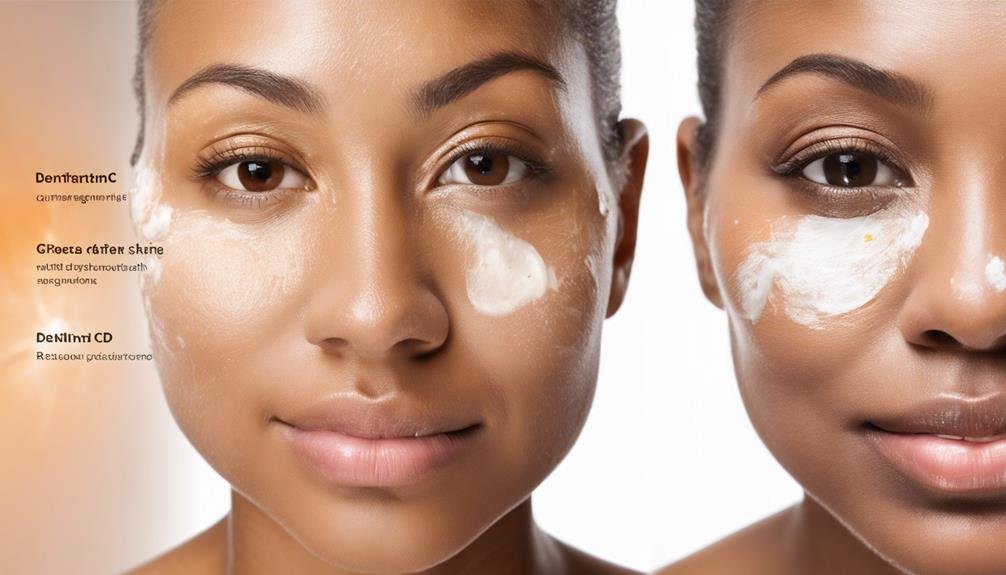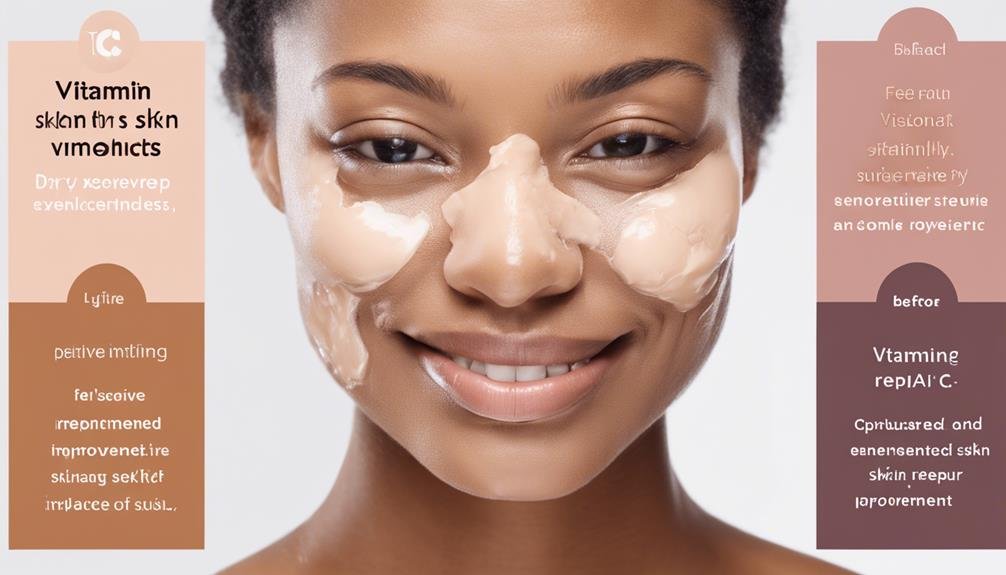When it comes to skincare, Vitamin C stands out as a versatile and effective ingredient. Think about how incorporating this powerhouse antioxidant can revolutionize your skincare routine. The benefits extend beyond mere skin brightening and anti-aging properties. Its ability to repair sun damage, reduce hyperpigmentation, and defend against UV damage is just the beginning. Let's explore how this simple addition can transform your skin for the better.
Key Takeaways
- Vitamin C brightens skin, reduces dark spots, and evens tone.
- It boosts collagen, fights aging signs, and improves skin texture.
- Vitamin C repairs sun damage, reverses UV damage, and reduces inflammation.
- It promotes wound healing, repairs skin damage, and reduces hyperpigmentation.
- Vitamin C inhibits melanin production, lightens dark spots, and evens skin tone.
Skin Brightening
If you're looking to achieve a brighter complexion, incorporating Vitamin C into your skincare routine can be a game-changer. Vitamin C, also known as ascorbic acid, is a powerful antioxidant that plays a crucial role in skin health.
When applied topically, Vitamin C can help brighten the skin by reducing the appearance of dark spots, hyperpigmentation, and uneven skin tone. This potent ingredient works by inhibiting melanin production, the pigment responsible for dark spots, resulting in a more even and radiant complexion.
Research has shown that Vitamin C not only brightens the skin but also helps to protect it from environmental aggressors such as UV radiation and pollution. By neutralizing free radicals and promoting collagen production, Vitamin C can aid in reducing the signs of aging and maintaining a youthful glow.
To reap the full benefits of Vitamin C for skin brightening, look for serums or creams containing a stable form of Vitamin C, such as ascorbic acid or sodium ascorbyl phosphate. Incorporating this powerhouse ingredient into your daily skincare regimen can help you achieve a luminous complexion and a more youthful appearance.
Even Skin Tone
For those aiming to achieve an even skin tone, incorporating Vitamin C into your skincare routine can be a beneficial step. Vitamin C is known for its ability to help fade dark spots, hyperpigmentation, and acne scars, leading to a more uniform complexion. This powerful antioxidant works by inhibiting melanin production and promoting skin cell turnover, resulting in brighter and more balanced skin.
Here is a breakdown of how Vitamin C can help you achieve an even skin tone:
| Benefits of Vitamin C for Even Skin Tone | Details |
|---|---|
| Fades Dark Spots | Reduces hyperpigmentation |
| Evens Out Skin Tone | Balances uneven areas |
| Diminishes Acne Scars | Helps in scar lightening |
| Promotes Skin Cell Turnover | Enhances skin renewal process |
| Protects Against UV Damage | Shields from sun-induced discoloration |
Anti-Aging Properties
Discover the potent anti-aging properties of Vitamin C in skincare. Vitamin C is a powerhouse ingredient known for its ability to combat signs of aging effectively. It works as an antioxidant, neutralizing free radicals that can damage skin cells and lead to premature aging.
By incorporating Vitamin C into your skincare routine, you can help reduce the appearance of fine lines, wrinkles, and age spots, promoting a more youthful complexion.
Vitamin C also aids in boosting collagen production, which is essential for maintaining skin elasticity and firmness. Additionally, it can help improve skin texture and overall tone, giving you a radiant and rejuvenated look. Regular use of Vitamin C products can contribute to a smoother, brighter, and more youthful skin appearance over time.
When selecting Vitamin C skincare products, opt for stable formulations that are packaged in opaque containers to protect the ingredient from light and air exposure. Remember to apply Vitamin C products consistently to reap the full benefits of this anti-aging powerhouse.
Collagen Production
Boosting collagen production is a key benefit of incorporating Vitamin C into your skincare routine. Collagen is a protein that provides structure and elasticity to your skin, helping it look supple and youthful. Vitamin C plays a crucial role in collagen synthesis, making it essential for maintaining skin firmness and preventing signs of aging.
| Benefits of Vitamin C in Collagen Production | How it Works |
|---|---|
| Stimulates collagen synthesis | Vitamin C promotes the production of collagen, which helps improve skin elasticity and reduce the appearance of wrinkles. |
| Protects existing collagen | By neutralizing free radicals, Vitamin C protects the collagen you already have from damage, maintaining skin firmness. |
| Enhances wound healing | Vitamin C aids in the body's natural wound healing process, contributing to the formation of new collagen fibers. |
| Improves skin texture | With increased collagen production, Vitamin C helps smooth out uneven skin texture, resulting in a more radiant complexion. |
Sun Damage Repair
Incorporating Vitamin C into your skincare routine not only boosts collagen production but also plays a key role in repairing sun damage. Sun exposure can lead to skin discoloration, fine lines, and wrinkles due to the harmful effects of UV radiation.
Vitamin C, with its antioxidant properties, helps neutralize free radicals generated by sun exposure, reducing oxidative stress and inflammation in the skin. This, in turn, aids in repairing damaged skin cells and promoting a more even skin tone.
Studies have shown that topical application of Vitamin C can help in reducing the appearance of sunspots and hyperpigmentation, enhancing the skin's natural healing process. By incorporating Vitamin C serums or creams into your daily skincare regimen, you can work towards reversing some of the sun damage your skin has endured over time.
Hydration Boost
For optimal skin health, maintaining proper hydration is essential. Hydrated skin appears more plump, radiant, and youthful. Vitamin C plays a crucial role in providing a hydration boost to your skin. This powerful antioxidant helps in retaining moisture, resulting in a smoother and more supple complexion.
—
| Hydration Boost Benefits | Description |
|---|---|
| Increases Moisture Levels | Vitamin C helps to enhance the skin's ability to retain moisture, keeping it hydrated throughout the day. |
| Improves Skin Barrier Function | By strengthening the skin's natural barrier, Vitamin C aids in reducing water loss and protecting against external aggressors. |
| Enhances Radiance | Proper hydration leads to a glowing complexion, and Vitamin C contributes to a more luminous and healthy skin appearance. |
—
Acne Prevention
Wondering how to keep acne at bay and promote clearer skin? Vitamin C could be your skincare superhero. Vitamin C isn't only beneficial for brightening and hydrating the skin but also for preventing acne. Thanks to its anti-inflammatory properties, Vitamin C can help reduce redness and inflammation associated with acne breakouts.
It also aids in regulating oil production, which can contribute to preventing clogged pores and breakouts.
Acne is often caused by excess oil, dead skin cells, and bacteria clogging pores, leading to inflammation and breakouts. By incorporating Vitamin C into your skincare routine, you can help address these root causes of acne. Vitamin C's antioxidant properties also help in protecting the skin from environmental stressors that can trigger breakouts.
To reap the acne-fighting benefits of Vitamin C, look for serums or moisturizers containing this potent ingredient. Consistent use can help you achieve clearer, healthier skin by keeping acne at bay.
Antioxidant Protection
[TEXT]:
To effectively shield your skin against the damaging effects of environmental stressors and free radicals, incorporating antioxidants into your skincare regimen is crucial. Antioxidants like Vitamin C play a vital role in protecting your skin from oxidative stress and promoting a healthy complexion. Here's why antioxidants are essential for your skin:
- Neutralizing Free Radicals: Antioxidants work by neutralizing free radicals that can cause damage to your skin cells, leading to premature aging and dullness.
- Boosting Collagen Production: Vitamin C, a powerful antioxidant, helps boost collagen production in your skin, promoting elasticity and firmness.
- Enhancing Sun Protection: Antioxidants can enhance the effectiveness of your sunscreen by providing added protection against the harmful effects of UV rays.
Skin Repair
Skin repair is a crucial aspect of skincare that focuses on rejuvenating and restoring your skin's health and appearance. Vitamin C plays a significant role in skin repair by promoting collagen production, which is essential for maintaining skin elasticity and firmness. Collagen is a key protein that helps in the regeneration of skin cells, leading to a smoother and more youthful complexion.
Additionally, vitamin C aids in repairing skin damage caused by environmental stressors like UV radiation and pollution. It helps to reduce inflammation, fade hyperpigmentation, and improve overall skin tone. By neutralizing free radicals and boosting the skin's natural regeneration process, vitamin C supports the repair of damaged skin cells, resulting in a more radiant and healthy complexion.
Integrating vitamin C into your skincare routine can enhance your skin's repair mechanisms, leading to improved texture, tone, and overall appearance. Regular use of vitamin C serums or creams can help address existing skin concerns and prevent future damage, promoting long-term skin health and vitality.
Wound Healing
Given the significant role of vitamin C in promoting collagen production and supporting skin repair, it's also essential to highlight its impact on wound healing. When it comes to wound healing, vitamin C plays a crucial role in the process due to its antioxidant properties and ability to promote tissue repair. Here are some key points to consider:
- Antioxidant Protection: Vitamin C helps protect the skin from oxidative stress, which can slow down the wound healing process.
- Collagen Synthesis: By stimulating collagen production, vitamin C helps strengthen the skin around the wound, aiding in faster healing.
- Reduction of Inflammation: Vitamin C can help reduce inflammation at the wound site, promoting a more efficient healing process.
Incorporating vitamin C into your skincare routine can't only improve the overall health of your skin but also enhance its ability to heal wounds effectively.
Hyperpigmentation Reduction
As you explore ways to address hyperpigmentation in your skincare routine, it's crucial to consider the role of vitamin C in reducing skin discoloration. Vitamin C is a potent antioxidant that can help lighten dark spots and even out skin tone. It inhibits the enzyme tyrosinase, which is responsible for producing melanin, the pigment that gives color to your skin. By reducing the production of melanin, vitamin C can effectively diminish the appearance of hyperpigmentation.
Moreover, vitamin C has been shown to brighten the skin and improve overall complexion. Its ability to increase collagen production also aids in fading dark spots and promoting a more even skin tone. With consistent use, vitamin C can help fade existing hyperpigmentation and prevent new spots from forming.
When incorporating vitamin C into your skincare routine for hyperpigmentation reduction, opt for serums or creams with a stable form of vitamin C, such as ascorbic acid, and apply it daily for best results.
UV Damage Defense
To fortify your skincare regimen further, consider the vital role of vitamin C in defending your skin against UV damage. Exposure to ultraviolet (UV) rays from the sun can lead to premature aging, sunburn, and an increased risk of skin cancer. Vitamin C can help protect your skin from these harmful effects by acting as an antioxidant and neutralizing free radicals generated by UV radiation.
Here are three ways in which vitamin C contributes to UV damage defense:
- Antioxidant Protection: Vitamin C helps to neutralize free radicals, reducing oxidative stress on the skin caused by UV exposure.
- Collagen Synthesis: By promoting collagen production, vitamin C supports skin repair and maintains elasticity, which can be compromised by UV radiation.
- Sun Damage Repair: Vitamin C aids in repairing damaged skin cells and reducing inflammation caused by UV rays, helping to enhance skin recovery and resilience.
Incorporating vitamin C into your skincare routine can provide an added layer of defense against the harmful effects of UV radiation, supporting healthier and more radiant skin.
Frequently Asked Questions
Can Vitamin C Be Used With Other Active Ingredients in Skincare?
Yes, you can use Vitamin C with other active ingredients in skincare. It's essential to check for potential interactions between products to ensure effectiveness and avoid irritation. Consider consulting a dermatologist for personalized advice.
What Is the Best Time of Day to Apply Vitamin C Serum?
In the morning, when the sun peeks over the horizon, is the optimal time for applying your vitamin C serum. Its antioxidant prowess shields your skin from daily stressors, giving you a radiant glow throughout your day.
Is It Safe to Use Vitamin C Products During Pregnancy?
During pregnancy, using vitamin C products is generally safe, but it's wise to consult with your healthcare provider. Vitamin C can provide antioxidants that are beneficial for your skin, but individual circumstances may vary.
Can Vitamin C Cause Skin Irritation or Sensitivity?
Vitamin C can cause skin irritation or sensitivity in some individuals due to its acidic nature. To prevent this, start with a patch test. If irritation occurs, try a lower concentration product or consult a dermatologist.
How Long Does It Take to See Results From Using Vitamin C Products?
You should start noticing improvements in your skin's texture and tone after about 4-8 weeks of consistent use of Vitamin C products. Results can vary depending on individual skin types, product formulations, and application frequency.
Conclusion
In conclusion, incorporating Vitamin C into your skincare routine can lead to a brighter, more even skin tone, reduced signs of aging, and improved overall skin health. So, why not give your skin the boost it needs with this powerhouse antioxidant? Remember, when it comes to skincare, Vitamin C is like the cherry on top of the sundae – the perfect finishing touch for a glowing complexion.







